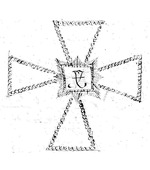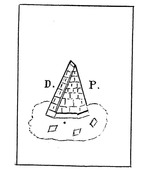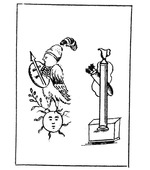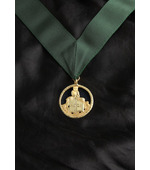The Secret School of Wisdom (paperback) - The Authentic Rituals and Doctrines of the Illuminati
Also Available as an ebook. Click Here to visit our website for digital downloads
The Secret School of Wisdom - The Authentic Rituals and Doctrines of the Illuminati is a pioneering text, a full working manual of the Order, and an astounding insight into the world's most intriguing secret society.
For more than two hundred years, the world has held a prejudiced view of the Illuminati. Much has been claimed for and against the Order - its name synonymous with secrecy, intrigue, and mystery in the modern context, despite a poverty of concrete evidence in the English language. Little has been said about the factual structure and development through its lifecycle. The Secret School of Wisdom - The Authentic Rituals and Doctrines of the Illuminati, is a ground-breaking text. It marks the first time that a comprehensive ritual book for the society has been re-assembled. Every degree,its instruction and associated texts, has been included and assembled in chronological order of progression. The reader is guided along the same path as many of Germany's most enlightened men, as they were in the years immediately prior to the French Revolution.
Much of this material has never been published - let alone translated into English. Supplemental texts are included to gain further historical insight into the Order and all documents have been checked for accuracy with the original archival texts.
What others are saying about The Secret School of Wisdom
"Although some of the rituals and documents have remained available in both libraries and digital archives, no English-language work has succeeded in presenting the magnificent treasure trove of original material as successfully as the book you are now holding in your hands. It is the first work of its kind to offer-for the first time-the full and complete system of the Illuminati under a single cover. Using original source materials, it succeeds in presenting a coherent and intelligible resource to students of Masonic rituals, secret societies, Enlightenment thinking, and little known aspects of world history. You may now read and study the authentic secret rituals and lectures which gave birth to the great conspiracies of today. As preparation of this book progressed I was thrilled to receive each new section, which I hungrily consumed, and compared with documents and manuscripts in my possession. I am happy to report that this book is everything I hoped it would be, and I am likewise happy to commend it to you."
Arturo de Hoyos, 33°, Grand Cross
Grand Archivist and Grand Historian
Supreme Council, 33°, Southern Jurisdiction, USA
The Secret School of Wisdom Review" - By Brother Shawn M. Gorley
You would be hard pressed in the recent months to find a Freemason who has not seen or heard the hype pertaining to the release of the book "The Secret School of Wisdom" edited by Josef Wäges, Reinhard Markner and translated to English by Jeva Singh-Anand and published by Lewis Masonic. It was quite apparent that the work they had compiled was going to be something special and one of a kind and their efforts in marketing the book showed this. Let me start out by stating after reading this book, all the hype, build up and anticipation of this unique book was highly worth the wait! The team that made this historic work possible have done an extraordinary job. If you are interested in learning just exactly what the real Bavarian Illuminati was, what it was about, how it came to be and more you will undoubtedly enjoy this book. However, if you are looking for easy answers about what famous movie stars are members and how it is connected to Hollywood as well as the so called "plots for world domination", I can assure you that not only does it not exist in those terms, but you will also most certainly be disappointed because this book does not deal with fiction or hearsay, it does however deal strictly with fact. In the past several hundred years the Illuminati has easily become the whipping boy for all sorts of conspiracy theorists and it's not at all surprising that it has because there simply was not enough information readily available to the general public to contradict the hundreds of silly and false claims. This book uncovers the much desired information and documentation that has been desired by students of history and the fact that it covers the topic of the Illuminati and does so in the English language is what makes this work not only one of a kind but historical as well. This work will without a doubt uncover any mysteries, preconceived ideas or notions one who thinks they know the real truth may have as well as provide the reader with factual, accurate and concise information, some of which has never been available in the English language much less accessible to the average person. The Illuminati, founded in 1776 by Adam Weishaupt (17481830) had only lasted nine short years when it was suppressed in 1785. During its short existence however it did manage to have a profound effect. Weishaupt, a professor of natural and canon law at the University of Ingolstadt at the time of its inception began to develop the secret society of freethinkers. The purpose of said secret society was to oppose superstition, bigotry and oppression as well as to embrace the ideals of equality, fraternity, and intellectual enlightenment which, given the period of history that this took place in one could imagine what risks such an organization would face. Even with that in mind the fraternity did prove to be quite popular having initiated several hundred members into its three degree system beginning with Novice, Minerval and, Illuminated degrees, which do seem to appear somewhat similar with Freemasonry.
Over the years the Illuminati has generally gotten a bad rap as some sort of evil world domination society that still exists today which couldn't be farther from the truth. Shortly after the disintegration of the order in 1785, lost of the original documents of this society were ordered seized by the government and sadly Weishaupt was banished from his own country. Is it no wonder then why there have been centuries of misinformation and conspiracy theories related to the Illuminati since, along with its confusion in relation to the fraternity of Freemasonry as both fraternities are similar in some aspects? With such a lack of credible factually accurate documentation this is definitely no surprise. These are the very reasons why this book "The Secret School of Wisdom" is so vitally important to truly understanding what the Illuminati were. I find this book to not only be extremely valuable to any aspiring student as it does make for great source material but it also has a great deal of value to the casual reader whom is merely interested in this topic. The other added bonus I found was that this book does not appear to be written and compiled for any specific genre, group or type of person as it can be easily understood and enjoyed by anyone and I firmly believe that this will allow this work a much greater audience and the high probability of sales across the board. Overall, I cannot recommend this book highly enough. It truly is a historic piece of literature covering a very misunderstood society. This is definitely a book that has been long overdue for centuries and my deepest congratulations to the entire team that made this book possible. It is because of them that we now have the ability to truly understand the secret society that was the Illuminati and I for one am grateful to them for that!
The Secret School of Wisdom Review - By Brother Scott Schwartzberg
www.twtmag.com
Weishaupt, known within the Order who's Order Name was Spartacus, wrote the degrees for the Minerval Class, as well as drafts for the Greater Mystery degrees of Magus and Rex . He envisioned the Order as a secret school to enlighten mankind through proper education and promotion of wisdom and virtue. Through this proper education, coupled with a strict moral regimen, mankind would gradually reap its rewards through the passage of time and the promotion of its members throughout society at large.
Baron evon Knigge, who's Order Name was known asPhilo, was insinuated into the Order in 1780. Von Knigge was a highranking member of the Rite of Strict Observance, a German Rite of Freemasonry, strictly observing athe Templar origin of Masonry, which was supposed to be governed by unknown and hidden Superiors. When the Rite went into decline, after the death of the founder, Baron von Hund, in 1776, the "Superiors" did not appear to help continue the Rite, and it was laid bare that there were any Unknown Superiors. Von Knigge was envisioning a new Rite as a reform of Strict Observance, when the Marquis de Costanzo, a member of the Aeropagus, convinced him that he did not need to start a new society, as there was one already in existence - the Order of the Illuminati. which he was informed of and , and he was initiated in 1780, whereupon he quickly advanced. Von Knigge recruited more members for the Order, and the new members were starting to thirst for access to the higher degrees, of which he himself was not in possession. He wrote to the Areopagite council for permission to receive and confer them. and this led to his direct communication with Weishaupt, and his eventual inclusion to the Areopagite council.
Weishaupt admitted that he himself was not in possession of the higher degrees, as they were still in his mind and had not been constructed yet. HeHe asked von Knigge to collaborate with them him to create the degrees. As Weishaupt was only a Fellow Craft Mason, von Knigge composed the degrees of the Freemasonic Class.
Baron von Knigge was forced to choose between remaining a member of yet another fraudulent order and revising and improving the Order of the Illuminati. Weishaupt was forced to accept the help of von Knigge, as he was the sole reason for the Order's propagation in Northern Germany. which he felt This advantage threatened Weishaupt's position as 'general' of the Order, so he agreed in order to prevent the unmasking the Order as a contemporary creation. Von Knigge also composed the degrees of the Lesser Mysteries, which were the final degrees completed before the dissolution of the Order. The degrees of the Greater Mysteries remained only in draft form, only the lectures being written. Knigge believed that the changes Weishaupt made to his ritual were a form of vandalism, and the two had a falling out, not to communicate again. Weishaupt had grand ideas in mind for the completion of the system of degrees in the Order, but was unable to coherently translate these ideas into the form of degrees. In my opinion, Weishaupt did not really understand just how vital his collaboration with Knigge was. He had ideas, but Knigge had the ability to craft meaningful degrees.
By 1785, the Order had come under suspicion by of the Bavarian
authorities. A series of edicts were issued by the Elector of
Bavaria, resulting in the fleeing of Weishaupt under the protection of Duke Ernst II, and the searches of the homes of several Areopagites yielded a trove of written materials, which was were published with the names of the members redacted , in order to expose and shame the group.
There were several issues that led to the failure of the Illuminati: Supposed to be democratically led by the council of Areopagite Councils, but Weishaupt, as general, unilaterally controlled the group. The Ritual and Degree System of the Order were not fully established until near the end of the Order, and remained incomplete.The Ritual and Degree System of the Order were not fully established until near the end of the group, and remained incomplete. With Weishaupt, "the general," in exile, the Order collapsed. Poor funding mechanisms.
For any serious student of Freemasonry, I can wholeheartedly recommend this book as a vital addition to your library. While Though not an easy read by modern standards, by studying the history of the Order, and the ritual of the degrees, one gets a much deeper understanding of this much-maligned group. Perhaps if it had been able to fulfill its promise, humanity would have benefited greatly over the last two centuries.
To illustrate this point I will close with some of the general statutes of the Order:
To reassure and assuage the doubts of perspective as well as actual members of the society and to anticipate any unfounded suspicions and fears the? 1 declares first of all that it harbors no harmful sentiments nor engages in any actions harmful to the state, religion, or good morals, nor does it approve of such among its own members. Its whole purpose and all its efforts are designed solely to make the improvement in perfection of his moral character interesting to man, imbue him with humane and social sentiments, thwart malicious intentions, come to the aid of an harassed and suffering virtue against injustice, further the promotion of worthy persons, and make useful knowledge which still remains largely hidden more generally available.
This is the unmasked purpose of the?. It stands for nothing else. ... A member who has been moved to join the? by the prospect of great power and riches will, however, not be the most welcome.
Review from the Scottish Rite Journal
Josef Wäges, Reinhard Markner, Jeva Singh-Anand, The Secret School of Wisdom: The Authentic Ritual and Doctrines of the Illuminati, London, UK: Lewis Masonic, 2015, Paperback, 448 pages, illustrations
Whether it was in Dan Brown's bestselling novel Angels and Demons (2000), Hollywood's Lara Croft Tomb Raider (2001), or in the old, infamous-and paranoid- work of John Robison, Proofs of a Conspiracy (1797), chances are you've heard about the Illuminati: a supposedly controlling and subversive secret society that pulls the strings in the world's political halls of power.
Have you ever wondered just exactly who and what the Illuminati really was? In a nutshell, the Illuminati (founded in 1776) was the brain-child of the notorious anti-cleric Adam Weishaupt. He infiltrated a Masonic Lodge to attract members, and set up his system as a branch of Freemasonry, conferring the Craft Degrees and other high degrees. In 1785 the Elector of Bavaria outlawed the group and its members were arrested as Weishaupt fled.
Although some of the rituals and papers were published in German, most avoided exposure. However, the entire ritual system of the Illuminati has been translated into English for the first time ever, and is now available in The Secret School of Wisdom: The Authentic Rituals and Doctrines of the Illuminati.
This book is a perfect synthesis of ritual book meets history book. All of the extant ritual texts in archive have been reconciled, meticulously translated, and combined to produce the most reliable account of the Illuminati's working ritual system. Included are the rituals, regalia, passwords, signs, and symbols of the world's most intriguing secret society. It's the book that sets the record straight on the world's most notorious secret society.
Submitted by Arturo de Hoyos, 33°, Grand Cross
Review From the Square Magazine
Reviewed by Tony Baker
The Bavarian Order of Illuminati* was formed in 1776 by Adam Weishaupt, Professor of Canon Law at the University of Ingoldstadt. Since it was a largely covert organisation, there is no way of knowing how large or small it was at its height. The avowed aim was to increase the morality, virtue and happiness of humanity across the whole world. The Order however, was suppressed by the Bavarian government in 1788, largely at the behest of the Jesuits, so it only existed for twelve years. Nonetheless, modern Freemasonry has received a good deal of unjustified criticism because of its aims and practices and anti-masons often encourage the belief that the Illuminati were part of mainstream Freemasonry in order to justify criticism of the Craft.
This is a very well-produced hardback book, printed in a typeface which is easy to read, with good illustrations several of which occupy a whole page. It begins with a historical summary, showing that the whole system of eight Degrees (Novice; Minerval; Illuminatus Minor; Illuminatus Major; Knight; Priest; Regent; and King) was created by Adam Weishaupt together with Baron von Knigge. This was a period when Freemasonry in England was in the period of schism between the 'Moderns' and the 'Antients,' whose rituals had been exposed in Three Distinct Knocks (1760) and Jachin & Boaz (1762), just fifteen years before the creation of the Illuminati. A comparison of the Masonic rituals of the two systems is very interesting.
The three Masonic Degrees as modified and used by the Order have never been published before. They are fascinating from a historical point of view and they are full of valuable messages for the interpretation of modern Freemasonry. The Illuminati despised the mainstream Freemasonry of the time, which they said had become: '... a meeting place of indolent and vile men, gathered together without discrimination' (p. 119) , who call: 'themselves Freemasons, but who have learnt nothing more than a few hieroglyphs that they do not understand in exchange for money wasted' (p. 127). The Preparatory Essay lists eight reasons why Freemasonry cannot improve mankind followed by eight reasons why the Illuminati could. Their aim was to set up in competition with regular Masonic Lodges, or to:
'secretly acquire a voting majority in those lodges and attempt either to reform or dismantle them' (p. 212).
The commitments of the members were considerable. Lodges were held at least once a month (p. 161) and, 'in some towns weekly meetings are arranged' (p. 162). The Brethren were asked to write monthly essays (p. 113). All the Brethren were also advised to:
'... read diligently and think about what you have read. Above all, use your own mind, not someone else's' (p. 66).
The rituals include some beautiful language and they must have been very impressive to see performed. I was, however, struck by the lack of esoteric or mystical content, which the name "Illuminati" had led me to hope for.
Also included are a lot of instructions to the members at all levels. These advocate continual reporting upwards on every member in the minutest detail.
'... nothing should be too trivial for the observer [...] since nature in fact tends to reveal the most in the smallest detail.' (p. 294).
The Secret Censor was told that he: '... must examine both their good and their evil side' (p. 115). 'To ensure that everything is reported, every member of the Magistracy had to keep a detailed diary' (p. 112). There were forms to be completed and: 'promotions to the higher degrees mostly depended on these reports' (p. 126). 'No-one is promoted until he is exactly as we want him to be' (p. 328). The Illuminatus Minor had to supervise two or more Minervals and 'He must visit them, or they must visit him, daily if possible' (p. 85). One is left with the impression of obsessional micro-management and control.
There were also many instructions on how to influence worldly affairs:
'Military schools, academies, book printers, book sellers, cathedral chapters, or any other institutions that influence education and government should never be ignored, and the Regents should unremittingly design plans for setting about gaining control over them' (p. 321).
However, they were not entirely honest with their members:
'... it is sometimes necessary to let the subordinates assume (but without resorting to untruths) that we secretly direct all other orders and Masonic systems, or that the most powerful monarchs are ruled by the Order.' (p. 318).
Their avowed aims may have been of the most laudable and noble kind but the means they chose to achieve them involved interference with the political and religious order of the whole world in a covert and underhand manner. They sought to organise and control the whole of humanity for its own good, but they were to be the judges of what that good was. The possibilities for corruption and abuse of power in such a system ring alarm bells in the reader's ears. One is left asking why, if the aims were so worthy, did they not argue openly for their cause rather than promoting it in secret.
The book is a very good read and I recommend it wholeheartedly.
* Not to be confused with the Illuminati of Avignon.
Review in Knight Templar magazine
This book is a scholarly, yet interesting, revelation of the rituals, regulations, and doctrines of the Illuminati, a secret society founded in May of 1776 by Adam Weishaupt, a professor of Practical Philosophy and Canon Law at the University of Ingolstadt in Bavaria, Germany. The order's goal was supposedly to free men's minds from both superstition and prejudice, encourage them to be good, and teach them that this was the true path to happiness. Goals consistent, of course, with the Age of Reason, of which Voltaire and Rousseau were exemplars. Growth was slow until 1780 when Baron Adolph Von Knigge joined the group. Von Knigge, a Freemason, modified the Masonic ritual to serve as part of the Illuminati ritual structure. In all, the Illuminati ritual was comprised of three distinct classes: (1) the Minerval Class, consisting of the Minerval and Illuminatus minor degrees; (2) the Freemason Class, consisting of the three modified Masonic degree rituals; and (3) the Mysteries Class, consisting of the degrees of Presbyter, Princeps, Docetists, and Philosophii. Due to its numerical growth, from about a dozen in 1780 to over 3,000 in 1783, rumors began to circulate that the Illuminati Society intended to change the government and impose their own ideals on the land. This led the Elector of Bavaria to issue edicts ordering the suppression of the group, one in 1784 and two more in 1785. Weishaupt was removed from his university post and later banished from Bavaria. He found asylum at the University of Gottingen in Thuringia, Germany, where he died in 1830 at the age of eighty-two.
The Introduction chapter of the book deals with the history of the Society and the development of its structure, rules, and ritual by Weishaupt, Von Knigge, and others. The remaining chapters are devoted to the three Classes of membership mentioned above, presenting their rituals, philosophies, system of government, and officer structures. Of particular interest to me was the chapter that concerned the Freemason Class and the comparison of the ritual of the three degrees given there compared to the ritual currently practiced in my state (Alabama). It is also worthy of note that in the Mysteries Class one could find many similarities to ideas, symbolism, and constructs used in the Scottish Rite and Masonic Rosicrucian rituals.
The book is copiously supplied with footnotes, and Latin and German words and phrases used in the ritual are translated into English. Diagrams and ciphers for the various class degrees are presented.
The book states that "the reader will trace a path akin to that of a career in the order, progressing from one stage to the next, ascending through the levels of knowledge and secrecy, and finally reaching those degrees which were meant only for the chosen few." In some places, particularly in the detailed statutes and regulations for the classes or degrees, the "path" is rather tedious, but this is amply compensated for by a careful perusal of the degree scripts, lectures, and symbolism.
Dan Brown's recent novels have awakened an interest in secret societies, conspiracy theories, and the Illuminati. However, this book is definitely not for leisure or entertainment reading but rather is for those wishing to fully explore the tenets of the Illuminati and undertake a deep and thorough study of their rituals and regulations.
By Sir Knight George L. Marshall, Jr., PGC, KCT
To do justice to the rich veins of research evoked by this book is not possible in a review. . It is a pleasure to read this thought-provoking collection - Journal for Research into Freemasonry and Fraternalism
Paperback, 447 pages, illustrations throughout


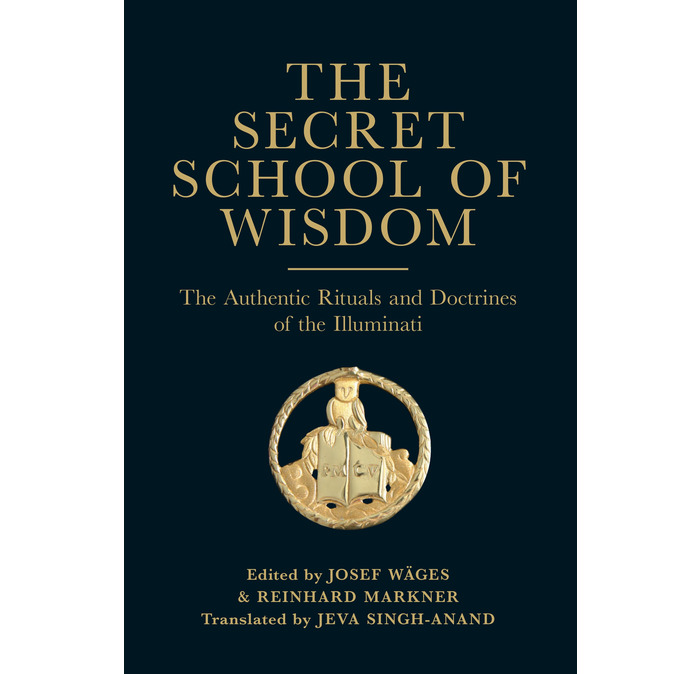
 Click on the image to enlarge
Click on the image to enlarge